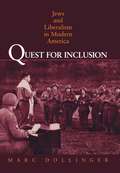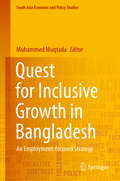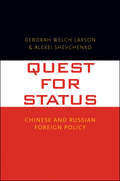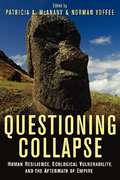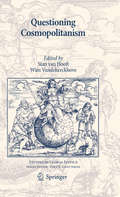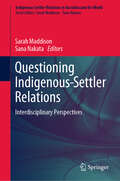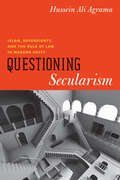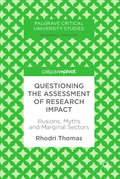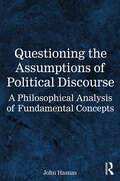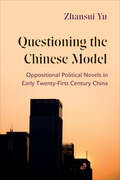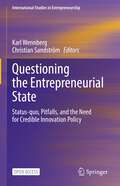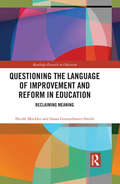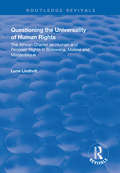- Table View
- List View
Quest for Inclusion: Jews and Liberalism in Modern American
by Marc J. Dollinger<p>For over sixty years, Jews have ranked as the most liberal white ethnic group in American politics, figuring prominently in social reform campaigns ranging from the New Deal to the civil rights movement. Today many continue to defy stereotypes that link voting patterns to wealth. What explains this political behavior? Historians have attributed it mainly to religious beliefs, but Marc Dollinger discovered that this explanation fails to account for the entire American Jewish political experience. In this, the first synthetic treatment of Jewish liberalism and U.S. public policy from the 1930s to the mid-1970s, Dollinger identifies the drive for a more tolerant, pluralistic, and egalitarian nation with Jewish desires for inclusion in the larger non-Jewish society. <p>The politics of acculturation, the process by which Jews championed unpopular social causes to ease their adaptation to American life, established them as the guardians of liberal America. But, according to Dollinger, it also erected barriers to Jewish liberal success. Faced with a conflict between liberal politics and their own acculturation, Jews almost always chose the latter. Few Jewish leaders, for example, condemned the wartime internment of Japanese Americans, and most southern Jews refused to join their northern co-religionists in public civil rights protests. When liberals advocated race-based affirmative action programs and busing to desegregate public schools, most Jews dissented. In chronicling the successes, limits, and failures of Jewish liberalism, Dollinger offers a nuanced yet wide-ranging political history, one intended for liberal activists, conservatives curious about the creation of neo-conservatism, and anyone interested in Jewish communal life.</p>
Quest for Inclusive Growth in Bangladesh: An Employment-focused Strategy (South Asia Economic and Policy Studies)
by Muhammed MuqtadaThis book offers a selection of intensely researched essays focused on the critical planning objectives and policy priorities that would enhance the promotion of inclusive growth in a developing country. It has taken Bangladesh as the case study. It argues for rethinking of traditional policies and provides arguments and ways to reorient these toward inclusive growth and better social inclusion. These involve a dedicated focus on employment and inclusion in the design of monetary and fiscal policies, trade and industrial policies, policies toward rural non-farm employment, social protection and safety net strategy and the nature of institutional and governance reforms which are imperative for ensuring inclusive growth. The studies included in the book were prepared before or at the onset of the ongoing COVID-19 pandemic and the unfolding economic crisis; yet they provide cursory observations on its likely impact, and underscore how the stated principles and policies of an inclusive growth strategy have become even more significant in the present situation. Bangladesh has been growing respectably during the past decade and a half and has arguably shown strong progress in several social indicators. However, inequality and vulnerability are rising alarmingly, and the economy is beset with high levels of corruption, as well as with various other governance deficits that can adversely affect future growth and social inclusion. The book provides a critical assessment of how far growth in Bangladesh has been inclusive, both over time, and in comparison to selected South and Southeast Asian countries. It constructs a specific ‘inclusive growth index’ with reference to what the study considers as the significant goals and pillars of inclusive growth. Bangladesh is not the only developing country that is faced with the arduous task of tackling unbalanced economic growth and of implementing the 2030 Agenda. Rising vulnerability, inequality, disappointing job growth and poor governance are also major challenges to inclusive growth for many countries in the Global South. Therefore, the appeal of this book extends well beyond the borders of Bangladesh and the South Asian region. Corresponding to SDG 8, the book is aimed at academia, researchers, policymakers, civil society leaders as well as other national and international development practitioners with an avid interest in issues concerning growth with equity, and in sync with the 2030 Agenda for Sustainable Development. In addition, the book is a valuable resource for interested students of disciplines related to economics and development policy.
Quest for Power: European Imperialism and the Making of Chinese Statecraft
by Stephen R. HalseyChina's late-imperial history has been framed as a long coda of decline, played out during the Qing dynasty. Reappraising this narrative, Stephen Halsey traces the origins of China's current great-power status to this so-called decadent era, when threats of war with European and Japanese empirestriggered innovative state-building and statecraft.
Quest for Status: Chinese and Russian Foreign Policy
by Deborah Welch Larson Alexei ShevchenkoA look at how the desire to improve international status affects Russia's and China's foreign policies Deborah Welch Larson and Alexei Shevchenko argue that the desire for world status plays a key role in shaping the foreign policies of China and Russia. Applying social identity theory—the idea that individuals derive part of their identity from larger communities—to nations, they contend that China and Russia have used various modes of emulation, competition, and creativity to gain recognition from other countries and thus validate their respective identities. To make this argument, they analyze numerous cases, including Catherine the Great’s attempts to westernize Russia, China’s identity crises in the nineteenth century, and both countries’ responses to the end of the Cold War. The authors employ a multifaceted method of measuring status, factoring in influence and inclusion in multinational organizations, military clout, and cultural sway, among other considerations. Combined with historical precedent, this socio-psychological approach helps explain current trends in Russian and Chinese foreign policy.
Quest for the Presidency: The Storied and Surprising History of Presidential Campaigns in America
by Bob RielQuest for the Presidency gathers in a single volume the compelling stories behind every presidential campaign in American history, from 1789 through 2020. Bob Riel takes us inside the 1800 clash between Thomas Jefferson and John Adams, the 1860 election that launched the Civil War, the 1948 whistle-stop comeback of Harry Truman, the Kennedy-Nixon drama of 1960, the 1980 Reagan Revolution, the historic 2008 election of Barack Obama, the turbulent 2020 battle between Joe Biden and Donald Trump, and everything in between. This engaging and insightful book includes a trove of entertaining stories about campaigns and candidates, and it goes beyond the campaign tales to also consider the threads that link elections across time. It sheds light on the continually evolving story of American democracy in a way that helps us to better understand present-day politics.
Question Of Zion
by Jacqueline RoseZionism is driven by the search for a homeland for the stateless and persecuted Jewish people. Yet it has infamously clashed with the rights of the Arabs in Palestine and become so controversial that deep understanding and reasoned public debate is increasingly difficult. Prominent British writer Jacqueline Rose uses her political and analytical skills to take an unprecedented look at Zionism—one of the most powerful ideologies of modern times. Rose enters the inner world of the movement and asks a new set of questions. How did Zionism take shape as an identity? And why does it seem so immutable? Rose argues that Zionism colours Israel's most profound self-image. In the most provocative part of her book, Rose proposes that the link between the Holocaust and the founding of the Jewish state—so often used to justify Israel's policies—needs to be rethought.
Questioning Architectural Judgment: The Problem of Codes in the United States
by Steven A. Moore Barbara B. WilsonThe book shines light on the problem of judgment, particularly in the realm of architectural "technics" and the codes that regulate it. The struggle to define "sustainability," and thus judge architecture through such lenses, is but one dimension of the contemporary problem of judgment. By providing the reader with an inherently interdisciplinary study of a particular discipline—architecture, it brings to the topic lenses that challenge the too frequently unexamined assumptions of the discipline. By situating architecture within a broader cultural field and using case studies to dissect the issues discussed, the book emphasizes that it is not simply a matter of designing better, more efficient, or more stringent codes to guide place-making, but a matter of reconstructing the boundaries of the systems to be coded. The authors are winners of the EDRA Place-Research Award 2014 for their work on the Green Alley Demonstration Project used in the book.
Questioning Authority: Political Resistance and the Ethic of Natural Science
by Diana M. JuddThe West is currently witnessing the slow destruction of the classical liberal tradition. The casualties are reason, the willingness to question political or religious authority, and the validity of natural science. Replacing these are a crippling intellectual relativism, political apathy, and a grave misunderstanding of natural science and its concomitant ethic. In this work, Diana M. Judd gets to the root of the matter by directly addressing the following questions: What is modern natural science? What effect did it have on how we think about politics? What are the dangers surrounding the marginalization of natural science and the liberal intellectual and political tradition? This is a work of political theory. It seeks to engage the political by addressing the question first posed by the ancient Greeks: How ought we to live? If we have indeed entered the age of endarkenment where religious dogma, intellectual apathy, and unquestioned authority increasingly hold sway, there is a need now, more than ever, to explore the meaning and significance of the origins of the modern political and scientific traditions Americans take for granted. It is from these traditions that Americans received the ideas of legitimate political resistance, reason, individual rights, religious freedom, and natural science. The importance of modern natural science and its relationship to these tenets of classical liberalism is the central concern of this book. Claims that science is dogmatic and ideological, and that the tenets of liberalism divide individuals, have become commonplace. It is Judd's intention to show how these claims err, by exploring what natural science is and how it evolved. This ethic centers on the radical idea that authority must be questioned. We ignore this to our peril. If individuals do not question what leaders say, we abdicate the rights and responsibility of self-rule and individual freedom.
Questioning Ayn Rand: Subjectivity, Political Economy, and the Arts (Palgrave Studies in Literature, Culture and Economics)
by Neil CocksQuestioning Ayn Rand: Subjectivity, Political Economy, and the Arts offers a sustained academic critique of Ayn Rand’s works and her wider Objectivist philosophy. While Rand’s texts are often dismissed out of hand by those hostile to the ideology promoted within them, these essays argue instead that they need to be taken seriously and analysed in detail. Rand’s influential worldview does not tolerate uncertainty, relying as it does upon a notion of truth untroubled by doubt. In contrast, the contributors to this volume argue that any progressive response to Rand should resist the dubious comforts of a position of ethical or aesthetic purity, even as they challenge the reductive individualistic ideology promoted within her writing. Drawing on a range of sources and approaches from Psychoanalysis to The Gold Standard and from Hannah Arendt to Spiderman, these essays consider Rand’s works in the context of wider political, economic, and philosophical debates.
Questioning Beneficence: Four Philosophers on Effective Altruism and Doing Good
by Jason F. Brennan Richard Yetter Chappell Ryan W. Davis Samuel ArnoldEffective Altruism is a movement and a philosophy that has reinvigorated the debate about the nature of beneficence. At base, it is the consistent application of microeconomic principles to beneficent action. The movement has exposed that many forms of giving do little good (or do active harm), but others do tremendous good.Questioning Beneficence uses Effective Altruism as a launch pad to ask hard questions about beneficence more generally. Must we be Effective Altruists, or are Effective Altruism and the ideas driving the movement a mistake? How much should we give—if anything— and how should we give it? What are the respective roles of different kinds of institutions? Is charity anti-democratic and do billionaire philanthropists have too much power? Is Effective Altruism just utilitarianism in disguise?Questioning Beneficence is written by four philosophers, each with distinct points of view. It introduces a new standard for debating ideas in philosophy as each author poses and answers three questions and each of his three co-authors responds to those questions in turn. Finally, the first author replies to his co-authors’ responses. Throughout the book, there is a spirit of curiosity, intellectual risk taking, and truth-seeking, rather than point-scoring and one-upmanship. This book demonstrates what open-minded, real dialogue on an important issue can be at its very best.Key Features: Introduces a new roundtable format for philosophical debates: each of four authors takes the lead in constructing and answering three questions, each co-author then responds, and the first author then replies to the others’ responses. Explores salient philosophical questions raised by beneficence, like Can philanthropy be undemocratic? Why are people so bad at charity and what can we do about it? How important is beneficence compared to other values? Can Effective Altruism be part of a meaningful moral life? Consistently written in a clear and engaging style, suitable for both undergraduate students and curious general readers
Questioning Collapse
by Patricia A. Mcanany Norman YoffeeQuestioning Collapse challenges those scholars and popular writers who advance the thesis that societies - past and present - collapse because of behavior that destroyed their environments or because of overpopulation. In a series of highly accessible and closely argued essays, a team of internationally recognized scholars bring history and context to bear in their radically different analyses of iconic events, such as the deforestation of Easter Island, the cessation of the Norse colony in Greenland, the faltering of nineteenth-century China, the migration of ancestral peoples away from Chaco Canyon in the American southwest, the crisis and resilience of Lowland Maya kingship, and other societies that purportedly 'collapsed'. Collectively, these essays demonstrate that resilience in the face of societal crises, rather than collapse, is the leitmotif of the human story from the earliest civilizations to the present. Scrutinizing the notion that Euro-American colonial triumphs were an accident of geography, Questioning Collapse also critically examines the complex historical relationship between race and political labels of societal 'success' and 'failure'.
Questioning Cosmopolitanism
by Wim Vandekerckhove Stan Van HooftThis book aims to provide cutting edge essays by leading scholars on cosmopolitanism. Cosmopolitanism is an emerging movement in global ethics and provides a meeting point between theorists of international law, political science, political philosophy, applied ethics, economics, development studies, and international relations. The second International Conference of the International Global Ethics Association will be held in Melbourne, Australia in June 2008 on the theme of 'Questioning Cosmopolitanism' and will attract major scholars from around the world. It is envisaged that the best essays from this conference will be published in the proposed book.
Questioning Credible Commitment
by Larry Neal D'Maris Coffman Adrian Leonard D'Maris Coffman Adrian LeonardFinancial capitalism emerged in a recognisably modern form in late seventeenth- and eighteenth-century Great Britain. Following the seminal work of Douglass C. North and Barry R. Weingast (1989), many scholars have concluded that the 'credible commitment' that was provided by parliamentary backing of government as a result of the Glorious Revolution of 1688 provided the key institutional underpinning on which modern public finances depend. In this book, a specially commissioned group of historians and economists examine and challenge the North and Weingast thesis to show that multiple commitment mechanisms were necessary to convince public creditors that sovereign debt constituted a relatively accessible, safe and liquid investment vehicle. Questioning Credible Commitment provides academics and practitioners with a broader understanding of the origins of financial capitalism, and, with its focus on theoretical and policy frameworks, shows the significance of the debate to current macroeconomic policy making.
Questioning EU Enlargement: Europe in Search of Identity (Routledge Studies on Democratising Europe)
by Helene SjursenThis new book takes a unique approach to the study of European enlargement, tackling key questions. What kind of understanding of the EU do the enlargement processes speak to? Do decisions to enlarge mainly suggest that the EU is a free market, focusing on potential economic gains? Do they indicate that there is a sense of common European identity? Or is the focus primarily on securing respect for democratic principles and human rights? Offering up-to-date studies of the EU enlargement processes and country-specific in-depth analyses, Questioning EU Enlargement will be a valuable resource for students and scholars of European studies, international relations and politics.
Questioning Indigenous-Settler Relations: Interdisciplinary Perspectives (Indigenous-Settler Relations in Australia and the World #1)
by Sarah Maddison Sana NakataThis book examines contemporary Indigenous affairs through questions of relationality, presenting a range of interdisciplinary perspectives on the what, who, when, where, and why of Indigenous–settler relations. It also explores relationality, a key analytical framework with which to explore Indigenous–settler relations in terms of what the relational characteristics are; who steps into these relations and how; the different temporal and historical moments in which these relations take place and to what effect; where these relations exist around the world and the variations they take on in different places; and why these relations are important for the examination of social and political life in the 21st century.Its unique approach represents a deliberate move away from both settler-colonial studies, which examines historical and present impacts of settler states on Indigenous peoples, and from postcolonial and decolonial scholarship, which predominantly focuses on how Indigenous peoples speak back to the settler state. It explores the issues that inform, shape, and give social, legal, and political life to relations between Indigenous and non-Indigenous peoples, both in Australia and globally.
Questioning Return: A Novel
by Beth KissileffStudent Wendy Goldberg spends a year in Jerusalem questioning the lives of American Jews who "return" both to Israel itself and to traditional religious practices. Are they sincere? Are they happier? The unexpected answers and her experiences (a bus bombing, a funeral, an unexpected suicide, a love affair, a law suit),lead her to reconsider her own true identity.
Questioning Secularism: Islam, Sovereignty, and the Rule of Law in Modern Egypt (Chicago Studies in Practices of Meaning)
by Hussein Ali AgramaThe central question of the Arab Spring—what democracies should look like in the deeply religious countries of the Middle East—has developed into a vigorous debate over these nations’ secular identities. But what, exactly, is secularism? What has the West’s long familiarity with it inevitably obscured? In Questioning Secularism, Hussein Ali Agrama tackles these questions. Focusing on the fatwa councils and family law courts of Egypt just prior to the revolution, he delves deeply into the meaning of secularism itself and the ambiguities that lie at its heart. Drawing on a precedent-setting case arising from the family law courts —the last courts in Egypt to use Shari‘a law—Agrama shows that secularism is a historical phenomenon that works through a series of paradoxes that it creates. Digging beneath the perceived differences between the West and Middle East, he highlights secularism’s dependence on the law and the problems that arise from it: the necessary involvement of state sovereign power in managing the private spiritual lives of citizens and the irreducible set of legal ambiguities such a relationship creates. Navigating a complex landscape between private and public domains, Questioning Secularism lays important groundwork for understanding the real meaning of secularism as it affects the real freedoms of a citizenry, an understanding of the utmost importance for so many countries that are now urgently facing new political possibilities.
Questioning the Assessment of Research Impact: Illusions, Myths And Marginal Sectors (Palgrave Critical University Studies)
by Rhodri ThomasThis book provides the first comprehensive assessment of non-academic research impact in relation to a marginal field of study, namely tourism studies. Informed by interviews with key informants, ethnographic reflections on the author’s extensive work with trade and professional associations, and various secondary data, it paints a picture of inevitable research policy failure. This conclusion is justified by reference to ill-founded official conceptualisations of practitioner and organisational behaviour, and the orientation and quality of tourism research. The author calls for a more serious consideration of research-informed teaching as a means of creating knowledge flows from universities. Research with greater social and economic impact might then be achievable. This radical assessment will be of interest and value to policy makers, university research managers and tourism scholars.
Questioning the Assumptions of Political Discourse: A Philosophical Analysis of Fundamental Concepts
by John HasnasMuch of our contemporary political discourse rests on unquestioned assumptions. This book questions these underlying assumptions and then offers new, unconventional answers.Disputes over how to use government power assume that the use of government power is morally justified. Arguments over voting and the scope of democratic government assume that democracy is coherent form of government. Disputes over whether certain actions violate the rule of law assume that the rule of law is a genuine political value. Arguments over the scope of discrimination and affirmative action assume that there is an anti-discrimination principle that applies to all parties. And arguments over how to punish corporations assume that corporations can and should be punished.Each chapter of the book addresses one of these assumptions, and each is designed to serve both an educational and an argumentative purpose. Each begins with the educational aspect by providing the reader with necessary background information and a description of the current state of intellectual debate on the relevant subject. The chapter then proceeds to the argumentative stage by identifying the assumption upon which this debate rests, presenting reasons to believe that it is false, and presenting an alternative resolution to the debate.
Questioning the Chinese Model: Oppositional Political Novels in Early Twenty-First Century China
by Zhansui YuIn the early twenty-first century, the Chinese literary world saw an emergence of fictional works – dubbed as "oppositional political novels" – that took political articulation as their major purpose and questioned the fundamental principles and intrinsic logic of the Chinese model. Based on close readings of five representative oppositional Chinese political novels, Questioning the Chinese Model examines the sociopolitical connotations and epistemological values of these novels in the broad context of modern Chinese intellectual history and contemporary Chinese politics and society. Zhansui Yu provides a sketch of the social, political, and intellectual landscape of present-day China. He investigates the dialectic relationship between the arts and politics in the Chinese context, the mechanisms and dynamics of censorship in the age of the Internet and commercialization, and the ideological limitations of oppositional Chinese political novels. In the process of textual and social analysis, Yu extensively cites Western political philosophers, such as Hannah Arendt, Antonio Gramsci, Michel Foucault, and references well-regarded studies on Chinese literature, politics, society, and the Chinese intelligentsia. Examining oppositional Chinese political novels from multiple perspectives, Questioning the Chinese Model applies a broad range of knowledge beyond merely the literary field.
Questioning the Entrepreneurial State: Status-quo, Pitfalls, and the Need for Credible Innovation Policy (International Studies in Entrepreneurship #53)
by Karl Wennberg Christian SandströmThe 2008 financial crisis and the COVID-19 pandemic have made the authorities to increasingly turn inward and use ethnocentrism, protectionism, and top-down approaches to guide policy on trade, competition, and industrial development. The continuing aftereffects of such policies range from the rise and seeming success of authoritarian states, rise of populist and protectionist trends, and evolving academic agendas inspiring the reemergence of top-down industrial policies across the world. This open access edited volume contains contributions from over 30 scholars with expertise in economics, innovation, management, and economic history. The chapters offer unique theoretical and empirical contributions discussing topics such as how industrial policies affect risk, incentives, and information for investments. They also address the policy perspectives on new technologies such as AI and its implications for market entry, the role for independent entrepreneurship in increasingly regulated markets, and whether governments should focus on market interventions or institutional capacity-building. Questioning the Entrepreneurial State initiates a much sought-after debate on the notion of an Entrepreneurial State. It discusses the dangers of top-down approaches to industrial policy, examines lessons from such approaches for future policy design, and calls attention to the progress of open and contestable markets in a sound economy and society. “Creative destruction, innovation and entrepreneurship are at the core of economic growth. The government has a clear role, to provide the basic fabric of a dynamic society, but industrial policy and state-owned companies are the boulevard of broken dreams and unrealized visions. This important message is convincingly stated in Questioning the Entrepreneurial State.” Anders Borg, former Minister of Finance, Sweden “Misreading the dynamism of American entrepreneurship, European intellectuals and policy makers have embraced a dangerous fantasy: catching up requires constructing an entrepreneurial state. This book provides a vital antidote: The entrepreneur comes first: The state may support. It cannot lead.”Amar Bhidé, Thomas Schmidheiny Professor of International Business, Tufts University “This important new book subjects the emergence of the entrepreneurial state, which reflects a shift in the locus of entrepreneurship from the individual to the public sector, to the scrutiny of rigorous analysis. The resulting concerns, flaws and biases inherent in the entrepreneurial state exposed are both alarming and sobering. The skill and scholarly craftsmanship brought to bear in this crucial analysis is evident throughout the book, along with the even, but ultimately consequential thinking of the authors. A must read for researchers and thought leaders in business and policy." David Audtretsch, Distinguished Professor, Ameritech Chair of Economic Development, Indiana University
Questioning the Language of Improvement and Reform in Education: Reclaiming Meaning (Routledge Research in Education)
by Susan Groundwater-Smith Nicole MocklerQuestioning the Language of Improvement and Reform in Education challenges the language used in education by linking the language of both the public and professional domains with the changing intentions of the governance of education. Exploring various issues, which embody the many manifestations of the manner in which strident, conservative language has captured the public view of education, the book covers topics such as the importance of language in the context of educational practice, the media's portrayal of teachers globally, the role of students in the face of curriculum reform and the language used in educational policy worldwide. The book addresses the ways in which the words ‘improvement’ and ‘reform’ have been appropriated and hollowed-out by policymakers in order to justify globalised education policies. Using international case studies and reports, the authors argue that the employment of specific words masks the reality that new educational policies are regressive and require re-examination, while perpetuating the illusion that progressive educational practice is being brought to the fore. Questioning the Language of Improvement and Reform in Education is a fascinating and original take on this topic, which will be of great interest to educational practitioners, policymakers and linguists.
Questioning the Universality of Human Rights: African Charter on Human and People's Rights in Botswana, Malawi and Mozambique (Routledge Revivals)
by Lone LindholtFirst published in 1997, this volume analyses the material provisions of the African charter on Human and Peoples’ Rights from 1981, discussing the issues this raises both with respect to the theoretical aspects of human rights law, and in relation to its implementation in various African member states. Illustrating the first aspect, in particular the question of universality of human rights is discussed; with respect to the national implementation the Southern African states are the main focal points, in particular Botswana, Malawi and Mozambique.
Questions and Answers on Immigration in Britain
by Farid Raymond AnthonyThis guide to immigration to Britain uses a question and answer format to provide information in simple English. It ranges over: visitors; professional workers; students; business people; working in the UK; settlement; asylum; offences and deportation; appeals and British nationality.
Questions for America: 2024 and Beyond
by David Wheat Jack ReardonTo solve its multiple challenges post-2024, America must act with intelligence and wisdom, which can only come from an active and well-informed citizenry. The issues that confront us post-2024 are profound: climate change, inequality, artificial intelligence, an unstable geopolitical global order, existential threats from unfriendly nations, just to name a few. A democracy needs an educated society, which requires not just information, but knowledge and understanding.As the dust settles from the 2024 presidential election, we are faced with several philosophical issues. How we act post-2024 will affect our America and our children's America. Our future depends on the proactive action that we take now, which is influenced by how much we understand today's issues. This is a book about today's America.
